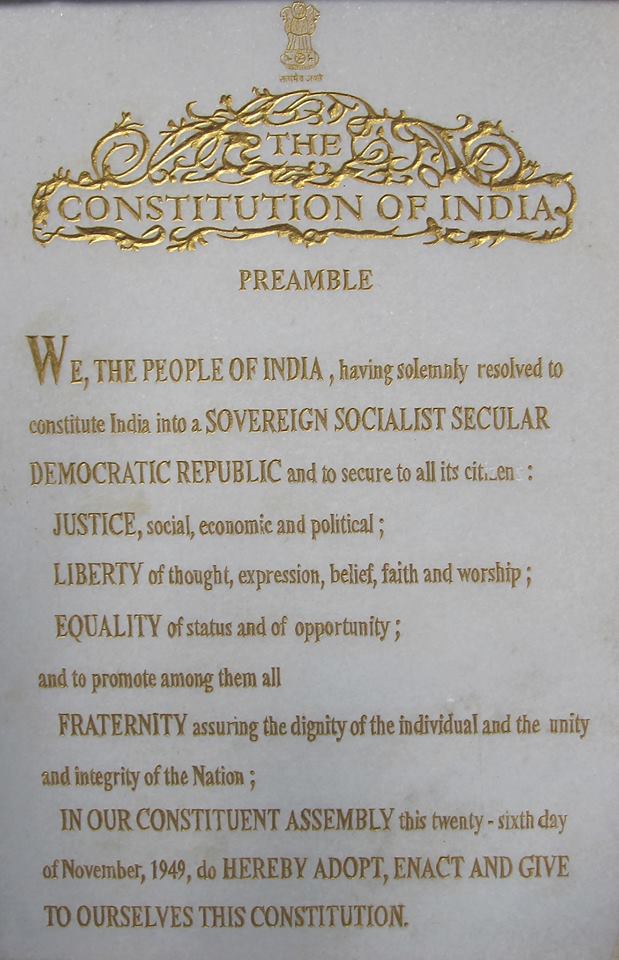Table of Contents
Preamble of Indian Constitution
This article deals with ‘Preamble of Indian Constitution.’ This is part of our series on ‘Polity’ which is important pillar of GS-2 syllabus . For more articles , you can click here
Introduction

| First Preamble | Constitution of USA was the first to have Preamble |
| Based on | Objective Resolution, 1947 drafted & moved by Nehru and adopted by Constituent Assembly |
| Words added later | SECULAR SOCIALIST INTEGRITY – Three words by 42nd Constitutional Amendment |
| Reveals | Four things 1. Source of authority : Derives power from people of India 2. Nature of state : Sovereign, Socialist , Secular, Democratic, Republic 3. Objective :To achieve Justice,Liberty,Equality & Fraternity 4. Date of Adoption : Nov 26,1949 |
Important Note : Order is important for Prelims
Sovereign -> Socialist -> Secular -> Democratic -> Republic (S3DR)
Keywords & Meaning
1 . Sovereign
- India is neither dependency nor dominion of any nation
- 1949 controversy : India declared continuance of full membership of commonwealth and accepted British crown as head of commonwealth but this did not affect sovereignty in any respect
2. Socialist
- Added by 42nd Amendment : Explicitly mentioned via Amendment although implicitly already present in form of Directive Principles
- Indian Socialism is Democratic Socialism which hold faith in mixed economy and has blend of both Marxism & Gandhism leaning heavily towards Gandhism
3. Secular
- Added by 42nd Amendment : Amendment stated it explicitly, although implicitly it was already present
- Constitution makers assured this through Articles 25 to 28
- Indian constitution envisaged positive concept of secularism ie equal protection of all religions by state (western countries have adopted negative concept of secularism and constructs wall between State & Religion )
- Concept of secularism of state ie State will have no religion was propounded in Minerva Mills Case 1980
4. Democratic
- Based on doctrine of popular sovereignty
- In India, Democratic system is indirect & Parliamentary
5. Republic
- Democratic
polity can be of two types
- Monarchy
- Republic
- India is Republic i.e head of state is elected and not hereditary
- All public offices in India are opened to all citizens
6. Justice
- Justice – social, economic & political
- Secured through various Directive Principles & F.R.
| Social Justice | Equal treatment of all |
| Economic Justice | Non discrimination of people on economic basis |
| Political Justice | Equal political rights to all people |
- Taken from Russian Revolution
7. Liberty
- Absence of restraints on activities of individuals and providing opportunities for development
- Secured through Fundamental Rights which are enforceable in court of law
- Qualified and not absolute
- Taken from French Revolution
8. Equality
- Absence of special privileges to any section of society
- There will be equality both of status as well as of opportunity.
9. Fraternity
- Fraternity means sense of brotherhood
- Promotes sense of brotherhood by single citizenship
- Fundamental Duties Article 51A also calls for fraternity
Preamble as part of Constitution
Question was raised that whether Preamble is part of constitution or not ? Various judgements of Supreme Court has given answer to these questions.
1 . Berubari union Case,1960
- Preamble is not part of constitution but shows key to minds of constitution makers
- When terms in constitution are ambiguous , preamble can be used in interpretation
2. Keshavananda Bharti case,1973
- Rejected earlier decision and held that Preamble is part of constitution
- But
- Neither source of power to legislature nor prohibits it
- Non justiciable & not enforceable by court
Amendability of Preamble
Another question which came up was that – Whether Preamble can be amended or not ? Supreme Court has given judgement on this issue
Keshavananda Bharti case,1973
- Preamble is part of constitution & since it is part of constitution it can be amended under Article 368
- But subject to condition that basic features are not amended in doing so/basic structure is not damaged.
Present Controversy on Socialism & Secularism Debate
BJP leaders frequently raise this issue that word Socialism and Secularism which was added in Preamble should be removed . But this is a controversial issue which needs serious debate .
My take on this issue
- Doctrine of Basic structure says that Socialist + Secular + Preamble constitute Basic Structure of Constitution. 44th Amendment reverted almost all key aspects of 42nd Amendment but Preamble remained unchanged .
- During Constituent Assembly Debates, Issue of including Secularism and Socialism in Constitution was sufficiently discussed. They were not included because
- Secularism : There was only one model of secularism known at that time which makes wall between State and Religion. But when in 1970s , we were sure that Indian variant of Secularism is different, we included it in Preamble
- Socialism : Same reason
- Elimination of economic inequality still remains our national goal & MNREGA & food security bill and Jan Dhan Yojana point towards that . Hence, Socialism remains important even today and shouldn’t be removed
